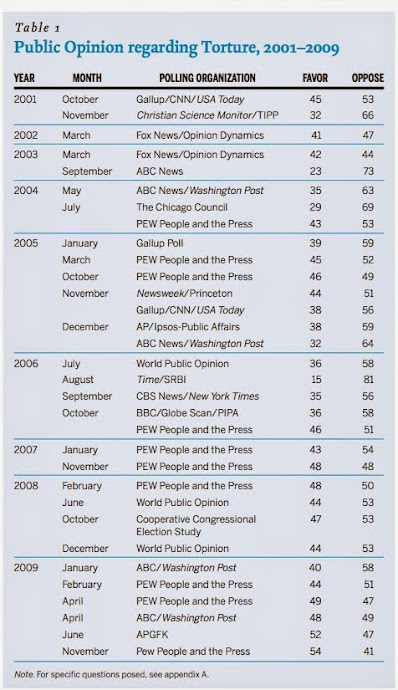It would be nice to think that the awful techniques cited in the newly released torture report would shock America's conscience -- forced "rectal feeding"; forced standing on broken legs: torture than led to convulsions, the loss of an eye, and death; torture that involved sleep deprivation for longer than a week; and so on.
But you look at the polling on torture and it's quite variable. What that tells me is that most Americans don't have either a strong sense that torture is right -- which would at least seem to represent some form of moral response -- or a strong sense that torture is abhorrent. They're ambivalent. Opinions vary depending on how questions are asked. And torture seems to have become a bit more popular in recent years.
A team led by Paul Gronke and Darius Rejali of Reed College argued in 2010 (PDF) that Americans oppose torture, citing quite a few polls:

But more recently, Amy Zegart has noticed a drift toward acceptance of torture:
... the polls suggest that public opinion has moved in the opposite direction: Americans are significantly more pro-torture now than during the Bush years. In 2007, 27 percent of Americans surveyed in a Rasmussen poll said the United States should torture prisoners captured in the war against terrorism. In an August, 2012 YouGov national poll I commissioned, 41 percent said they approved of torture, a gain of 14 points.Pew began noticing an uptick in support for torture in 2009, the first year of Barack Obama's presidency, with, alas, Democrats and independents responsible for a good bit of the uptick:
It’s not just the vague idea of torture that seems more acceptable now. Specific techniques garner more support, too. In a 2005 USA Today/CNN/Gallup poll, 16 percent said that waterboarding was right, 82 percent thought it was wrong. In the YouGov poll, 25 percent said it's right, and just 55 percent thought it was wrong. Support for naked chaining in cold rooms jumped from 18 percent in 2005 to 30 percent in 2012 while opposition plummeted from 79 percent to 51 percent, a drop of 28 points. Americans also favored threatening prisoners with dogs and religious humiliation in larger numbers while the percent opposing those techniques dropped dramatically.


Pew also found majority support for the notion that torture is "often" or "sometimes" justified in 2011:

Polls conducted early in the current debate, like this 2005 Gallup poll, showed that Americans objected to torture. But popular culture has made us more comfortable with torture, and an unpopular Bush presidency is a more and more distant memory. And so we got a 2009 Rasmussen poll showing that 58% of Americans approved of waterboarding would-be Christmas Day airline bomber Umar Farouk Abdulmutallab, and a 2014 YouGov poll showing that 27% of Americans would personally waterboard a terror suspect. (Yes, more respondents said they wouldn't, but it was a plurality -- 47% -- not a majority.)
Torture just isn't unthinkable for most Americans. Maybe it was just around the time we first learned about the Bush/Cheney torture regime, but we're used to the idea now.
...and the torturers- the inventors, the lawyers, the actors, the apologists, the watchers, the acceptors- all walk among us.
ReplyDeleteFUCK US!
ReplyDeletepopular culture has made us more comfortable with torture,
ReplyDeleteThis is where future historians (if there are any real ones) are going to damn us collectively the most. Sleepwalking through history, indeed.
The arguments seem to me to be mainly about whether torture resulted in useful information. Even those who claim it didn't are implicitly conceding that torture would have been OK if it produced results.
ReplyDeleteI can't say I'm surprised at this. Most people are very pragmatic when it comes to morality. And it is pretty awkward to maintain that it's OK to kill terrorist suspects by means of drones but not to rough them up a little.
No, Americans as a whole are not frightened or disgusted by torture at all. That was clear from the moment Bush et al began doing it. I don't understand all this boo hooing and "historically we are opposed to it" crap. This has simply never been true. Americans as a people have been willing to see their enemies tortured and killed--they've been angry at their own soldiers or citizens being tortured or killed (by the Japanese, say, or the Native Americans of popular fantasy). But nothing says "I'm in control" like taking the right to torture people as a given.
ReplyDeleteI don't even understand how anyone ever took people like McCain seriously. But anyone but McCain? Torture is something people opposed, like divorce, until they needed one. Then it was high time for no fault torture, just like they avail themselves of no fault divorce.
Sadly, aimai (as always) is right.
ReplyDeleteWhite dogs have no morals. Genocide of eighty-five million First Americans, check; conceived and financed Hitler's "holocaust", check; nuked a country and killed half a million people in an instant, check...
ReplyDeleteWhite dogs have no morals.
>Torture just isn't unthinkable for most Americans.<
ReplyDeleteMost of what liberals think is wicked isn't unthinkable for most Americans.
Redskins had it coming.
ReplyDeleteCause they were sitting atop our land?
ReplyDeleteYou could say that perhaps of the Aztecs, Cortez was enthusiastically joined by the other tribes that suffered under them, but IMHO, the cure was worse an the disease.
Indians raids (or atrocities) took place in the early morning right around sunrise for tactical reasons, and if settlements patrolled before then to catch any scouts unaware, then the raid would've been called off.
Take your racist shit somewhere else, Philo.
Anytime you would care to step outside philo (nigger), I would be more than happy to pop your head like the piss-puss pimple it is.
ReplyDeleteThe Revolution is here, boy.